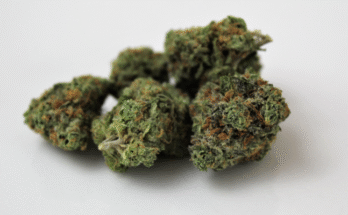Sorry folks, it’s probably not wise to smoke weed everyday.
A new study has found that smoking weed increases the chances of heart attacks and strokes.
However, a significant increased risk was only recorded among everyday smokers. Occasional users only had a very slightly higher risk of heart attack and stroke compared to non-users.
To me, it’s not surprising that burning plants and inhaling the smoke everyday comes with some risks.
So, what are the risks? How often is it safe to smoke cannabis? And are there ways to reduce risks?
Risks of daily cannabis smoking
After researching the risks of daily cannabis consumption, here’s what I’ve found…
I’m sure holes can be poked in many of these studies and the science is far from ‘settled’. However, as someone who smoked weed pretty much daily for 15 years and also has a strong interest in health, I believe these are likely risks that smoking daily carries.
- Short-term memory impairments
Research published in the journal JAMA Internal Medicine found that smoking weed daily for five years can harm your short-term memory – potentially permanently.
A group of researchers studied the cannabis habits of almost 3,400 Americans over 25 years. Afterward, participants took tests to measure cognitive skills like memory, focus, and decision-making.

Results showed that those who smoked cannabis daily for five years or more performed poorly on verbal memory tests in middle age compared to those who didn’t smoke or only used it occasionally.
This connection remained even after considering factors like age, education, substance use, and depression.
- Heart health
Using cannabis every day increases the chances of having a heart attack by 25%, according to research published in the Journal of the American Heart Association.
The study found a 42% higher risk of stroke among daily cannabis users.
This information is based on data collected from over 434,000 adults in the US between 2016 and 2020.
Occasional cannabis use carried only slightly increased risks: a 3% higher risk of heart attack and 5% for stroke compared to non-users.
Another study found people who reported using cannabis on a monthly basis showed no significant increase in the likelihood of experiencing a heart attack.
And there’re a number of other studies that found any amount of cannabis use poses no risk to heart health, so it’s far from confirmed.
- Lung health
It doesn’t take a genius to realise that smoking anything daily could have negatively affect lunch health.
Having said that, cannabis smoke is a lot less harmful to your health and is “distinctly different” than tobacco smoke, according to this research.
It found that while cannabis smoke could be associated with an increased risk of bronchitis, there was no elevated risk of pulmonary diseases such as small airway injury, lung disease, COPD, or lung cancer.
- Anxiety
A 2023 study found that teenagers who regularly use cannabis may experience anxiety and memory problems.
Researchers studied rats and found unusual changes in two parts of the brain called the dorsal and ventral regions of the hippocampus after exposure to THC, the active component in cannabis.
These changes varied in each region and might be linked to the cognitive and emotional effects of cannabis.
I have personally noticed that daily smoking increased my anxiety. Moderate doses of THC reliably raise heart rate and disrupt short-term memory in most people, which can easily lead to anxiety.
However, this clinical trial found: “Combined treatment of THC and CBD delayed the onset of anxiety, reduced its magnitude and shortened its duration compared to inhalation of THC alone.”

- Addiction
When you use cannabis, it directly affects your brain, mainly through THC hitting the CB1 receptor, giving you that happy feeling, pain relief, the munchies, and red eyes, etc.
But here’s the thing: using cannabis regularly messes with your brain’s dopamine production. So, over time, you’ll need more THC to feel the same high. That’s called building tolerance.
Cannabis boosts dopamine in a brain region called the nucleus accumbens, just like other rewarding substances do. This makes getting high on weed feel pleasant and can lead to addiction.
However, similar to many other substances, only around 10% of cannabis consumers become addicted. And obviously, smoking weed everyday may very well increase the chances of getting addicted to it.
Does cannabis cause psychosis?
One of the biggest myths about cannabis is that it causes psychosis.
It is regularly touted in mainstream press and by prohibitionists as one of the main reasons why weed should remain illegal.
What these views fail to realise, however, is that the association between cannabis use and psychosis is not causative.
In fact, there are a number of recent studies that prove conclusively that cannabis doesn’t cause psychosis. Here they are:
1. Twin study
This study from 2021 on twins found that THC use has little impact on rates of psychosis. Looking at nearly 3,000 sets of twins over their lifetime, researchers found no evidence of an effect of cannabis on psychosis rates.
Put simply, rates of psychosis were the same no matter that one twin used cannabis and the other didn’t.
2. Schizophrenia study
Published in 2018, this study looked at the genome of nearly 200,000 people and found that those who are genetically predisposed to schizophrenia are more likely to smoke weed, possibly as a form of self-medication.
“Our study showed that people with a vulnerability to develop schizophrenia are at increased risk of using cannabis,” said Jacqueline Vink, lead author of the study.
3. Review study
In Cannabis and Psychosis: a Critical Overview of the Relationship, researchers looked at recent research on cannabis and psychosis, including studies done with schizophrenic patients and studies of first-episode psychosis.
They found that the evidence suggests that cannabis does not in itself cause a psychosis disorder.
“Rather, the evidence leads us to conclude that both early use and heavy use of cannabis are more likely in individuals with a vulnerability to psychosis,” the study says.

Another more recent twin study discovered that any connections between cannabis use and mental health issues are mainly influenced by genetics and environment rather than directly caused by cannabis itself.
Read: Cannabis’ Impact On Mental Health: Correlation Vs Causation
Is it safe to smoke cannabis weekly or monthly?
Based on my research and personal experience, smoking weed once a week or a couple times a month is probably safe for most people.
If anything, there might be very slight increased risks for certain conditions.
However, cannabis is not for everyone and individuals should judge the effects of cannabis themselves.
Should you smoke weed while young?
This study from 2022 used a statistical method called Bayesian causal network (BCN) modelling to examine whether there is a causal relationship between cannabis use and changes in the brain during adolescence.
The study included 637 adolescents who had not used cannabis at age 14. The researchers looked at various factors that could potentially influence brain development, including cannabis use, demographics, mental health, and other substance use.
They found that the BCN algorithms consistently indicated a relationship between cannabis use and thinning of a part of the brain called the prefrontal cortex.
Previous research has associated prefrontal cortex thinning with the development of depression in adolescence.
Therefore, if you are under 25, your brain is still developing, so it would be wise to avoid frequent use of cannabis.
Safest way to consume cannabis
The healthiest ways to take cannabis do not include smoking it. This is because the process of combustion produces lots of harmful chemicals.
- Dry herb vape
Using a dry herb vape avoids combustion and is much smoother on the throat and lungs, allowing you to inhale all the beneficial plant oils in cannabis – like cannabinoids and terpenes – while preserving the health of your lungs.

- Edibles
Edibles are also a good way to avoid combustion, although eating THC can be a more intense experience than inhaling it.
- CBD
High doses of THC commonly causes an increase in heart rate accompanied by anxiety and even paranoia. This is especially true in those with a low tolerance for THC.
Some other cannabinoids, like CBD and CBG, however, have a unique ability to reduce the negative effects from THC. CBD in particular can offset the effects of THC without reducing the ‘high’. Adding CBD and CBG to your weed can make the experience more manageable and enjoyable.
- T-breaks
Cannabis has many amazing benefits. However, too much of a good thing can have some drawbacks.
And that’s true of cannabis – consume too much too often, and your tolerance will build until the euphoric effects you once experienced after just a few puffs will be difficult to achieve no matter how much you consume.
This is why tolerance breaks (or T-breaks) should be considered as a regular practice. Not only will they reset your sensitivity to THC, but they can also help you take stock of your relationship with cannabis and keep your usage under control.
Final thoughts
Overall, the take-home message is one of moderation.
Like many things, do it too much and it could cause some problems.
However, keep mindful of your usage and you can experience the benefits while minimising the risks.
Win, win!
Sign up to our newsletter below for more insightful cannabis content.




